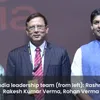These students want to revolutionise the weather prediction market with hyperlocal forecasting startup
Founded in 2020, Frizzle is a software and hardware IoT firm, which claims to provide more than 90 percent accurate hyperlocal weather forecasts. It is working with 4 clients and targeting farmers along with delivery and agriculture startups.
Vanya Arikutharam would have done well to recall what AA Milne said via Winnie the Pooh aeons ago: “Tut, Tut! It looks like rain!"
The engineering student at PES University, Bangalore, was walking home when it suddenly started raining, leaving the electronic equipment she was carting irrevocably damaged.
It was 2019, and she had relied on a weather app to gauge the day’s climatic conditions.
“I checked the weather on one of these apps, which said the day was going to be sunny. But the precarious Bangalore rain started and I realised the gap in the way weather is predicted,” Vanya says.
It was 2019, and she knew something had to be done so that the weather didn’t rain on anyone’s parade.

Vanya Arikutharaman (second from left) with her team and Frizzle's hardware device
Vanya joined hands with three of her college mates who then turned co-founders– Anantha Krishna, Abhilash V, and Rishith Bhowmick– and found the weather prediction market was still macro instead of micro.
“The information collection usually happens through satellite, which is very good for giving weather data for a city or a state. But what if you need information for your area? That is either not available or not accurate. But that has deeper use cases for farmers and business owners,” Vanya says.
In 2020, Vanya and her friends decided to start , an internet of things (IoT) firm building the “next-generation of hyper-local weather forecasting services” .
Run by Kurtle Technologies Pvt. Ltd., Frizzle works with micro, small and medium enterprises (MSMEs) by leveraging weather forecasting and insights to have better margins, improved efficiencies, and higher customer satisfaction.
“We majorly focus on hyperlocal weather forecasting. For instance, if a resort focuses mainly on outdoor activities, including jungle safari and bonfires, the customer experience is definitely compromised if it starts to rain. That cost is borne by the owner. But accurate predictions could have let them plan something else altogether,” Vanya says.
How does Frizzle work?
Frizzle uses a combination of hardware and software for weather prediction. The four co-founders have created a device that collects hyperlocal weather information, which is then combined with historical data collected from open sources.
“We have our own forecasting algorithm, which is a hyperlocal weather entry, based on years’ worth of historical data. And, we have an additional feedback loop from devices,” Vanya says.
These two are combined through an algorithm, which then predicts the weather.
The small and cost-effective device can be fixed or taken on the go. The hyperlocal weather engine gathers weather insights right from your location, “anywhere from five minutes to six months into the future”.
The parameters it considers include temperature, pressure, humidity, rain, cloud over, and other conditions.
Vanya and her co-founders claim that their device is able to predict weather with over 95 percent accuracy.
“Most weather forecasting players take data from satellites. We have taken a bottom-up approach instead.”
So far, Frizzle has been testing their hardware and software with resorts, sports clubs, and farmers. The pricing varies greatly, but the average yearly plan costs about Rs 7 lakh.

Credit: YourStory Design
“Our software is more in demand rather than the hardware as consumers find it a bit easier to operate. But the hardware gives 2-3 percent better accuracy than the software,” says Abhilash V, Co-founder and COO, Frizzle.
The firm is also in the process of testing their product with food delivery aggregators and agriculture startups.
The market and outlook
Hyperlocal data collection has become the new hot sector after the success of . Backed by Qualcomm Ventures and Lightbox, MapmyIndia, which creates navigational maps, analytics, and tracking APIs for India, got listed on the Indian stock exchange in December 2021.
Weather forecasting services differ in terms of their usage, technology, and forecast purposes but are needed in aviation, marine, agriculture, energy & utilities, oil & gas, among other industries. This helps plan weather-sensitive operations in advance.
According to marketsandmarkets.com, the weather forecasting services market size is projected to grow from an estimated $1.7 billion in 2021 to $2.7 billion by 2026, at a CAGR of 9.9 percent during the forecast period.
While Frizzle’s hardware and software combination could be rare, it directly competes with more than a dozen weather-forecasting apps, including AccuWeather, My Radar and Dark Sky.
But the founders are not worried.
In the next few months, Vanya and her team want to build their brand to become a reliable weather source for enterprises. “We aim to reach about 100 customers by the end of 2022.”
Edited by Teja Lele









